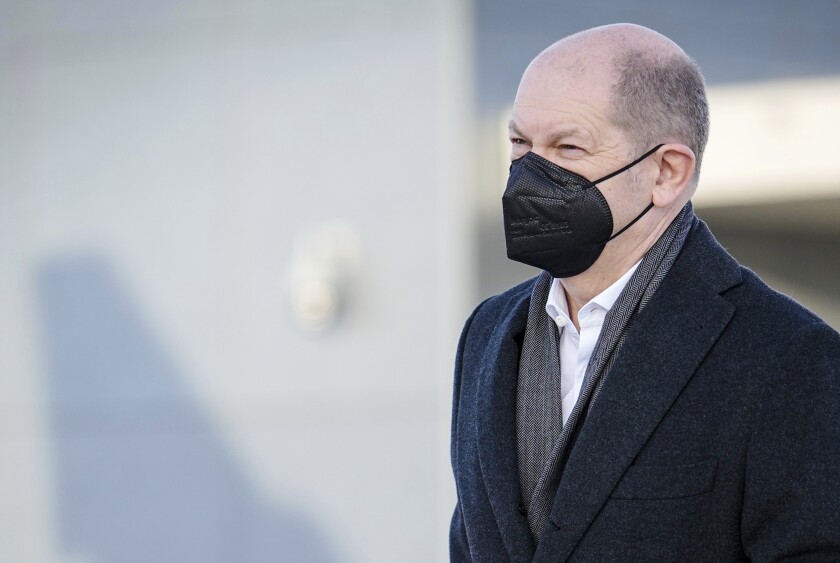German Chancellor Olaf Scholz visited Ukraine Monday in a diplomatic frenzy aimed at averting a feared Russian invasion that some warn could come within days.
Scholz is then scheduled to head to Moscow, where he will try to persuade Russian President Vladimir Putin to back down.
US officials have warned that Russia could strike this week. Moscow denies any such plans, but it has mobilized more than 130,000 troops near Ukraine and, in the US view, has amassed enough firepower to launch a swift attack.
Amid growing concerns about an impending war, some airlines canceled flights to the Ukrainian capital and troops there unloaded new arms shipments from NATO members on Sunday. The United States, Britain and other European countries told their citizens to leave the country and Washington was withdrawing most of the staff from its embassy in Kiev.
The Ukrainian air traffic safety agency, Ukraerorukh, issued a statement declaring the space over the Black Sea a “zone of possible danger” due to Russian naval maneuvers and recommended that planes avoid flying over the area between February 14 and 19. .
The United States and its NATO allies have reiterated that Russia will pay a heavy price for any invasion, but have struggled at times to show a united front. The Scholz government, in particular, has been criticized for refusing to provide lethal weapons to Ukraine or spell out what sanctions it would support against Russia, raising questions about Berlin’s resolution to Moscow.
That meant the foreign minister’s visits this week were closely watched for signs that he was backing away from the message from Washington and other NATO allies.
For now, those warnings seem to have had little effect: Russia has done little more than move more troops and weapons into the region and have launched huge maneuvers in the territory of its ally Belarus, which also borders Ukraine. The West fears that Moscow could use the exercises, which entered their decisive phase last week and last until Sunday, as cover for an invasion from the north.
Moscow wants assurances from the West that NATO will not allow Ukraine and other former Soviet countries to join the alliance and that the group will stop its weapons deployment in Ukraine and withdraw its forces from Eastern Europe. The United States and NATO have flatly rejected those demands.
Some observers hope Moscow will eventually agree to a compromise that will help avert hostilities and allow all sides to save face. Although NATO refuses to close the door on Ukraine, the alliance also has no intention of including the country or any other former Soviet country soon. Some experts have floated ideas such as a moratorium on NATO expansion or giving Ukraine a neutral designation to defuse tensions.
Ukraine’s ambassador to Britain, Vadym Prystaiko, appeared to be aiming for that middle ground, telling the BBC on Sunday that the country could drop its goal of joining NATO – a goal written into its constitution – if it prevents a war with Russia. .
“We could, especially if we are threatened like that, blackmailed by that, and pushed into it,” Prystaio told BBC Radio 5.
However, the ambassador appeared to back down on Monday, saying that “to avoid war, we are willing to make many concessions … but it has nothing to do with NATO, which is enshrined in the constitution.”
In an hour-long call with Putin on Saturday, US President Joe Biden said invading Ukraine would cause “widespread human suffering” and that the West was committed to ending the crisis but “equally prepared for other situations.” the White House said.
Biden also spoke for an hour Sunday with Ukrainian President Volodymyr Zelenskyy, and they agreed to maintain deterrent and diplomatic efforts to try to stem a Russian offensive.
As he has done before, Zelenskyy tried to minimize the idea that the conflict is imminent, noting that Kiev and other cities in Ukraine “are safe and under reliable protection.”
In addition, his office’s summary of the call also quoted him as saying that a quick visit by Biden could help de-escalate the situation, pointing to Zelenskyy’s hopes that the US president could make the trip. The White House did not mention that possibility in its comment on the conversation.
“I am convinced that his arrival in Kiev in the next few days, which are crucial to stabilize the situation, would send a strong message and contribute to de-escalation,” Zelenskyy told Biden, according to his office.
The Biden administration has been increasingly vocal about its concern that Russia could create a false pretext for an invasion in the coming days.
Russia and Ukraine have been locked in a bitter conflict since 2014, when Ukraine’s pro-Kremlin president was deposed in a popular uprising. Moscow responded by annexing the Crimean Peninsula and then backing a separatist insurgency in eastern Ukraine, where fighting has left more than 14,000 dead.
A 2015 peace deal brokered by France and Germany helped stop large-scale fighting, but skirmishes have continued regularly and efforts to reach a political settlement are stalled.

